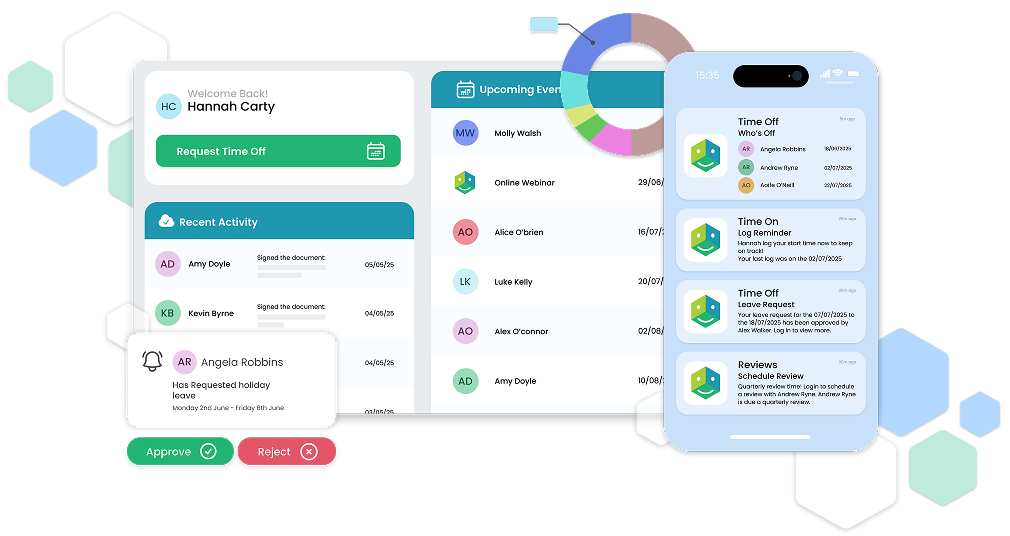Diversity, equity and inclusion (DEI) is an essential aspect of HR work. It’s a cornerstone that fosters a more welcoming and fair working environment and creates a culture where everyone feels they belong.
However, it’s crucial to realise that DEI reporting is not just a part of HR, but a critical area intrinsically linked to compliance.
To meet legally binding directives, HR professionals have to stay updated with the latest requirements and best practices. So, let’s recap what we need to know.
Understanding DEI Reporting Requirements
In Ireland, DEI reporting has come to the fore with the introduction of the Gender Pay Gap Information Act in 2021. Beyond ensuring equal pay for equal-value work – which is required under the Employment Equality Acts – it’s about gender representation. It shines a light on the difference between the proportion of women in lower-paid jobs compared to men.
In 2022, the gender pay gap in Ireland favoured men by 9.6%. This is significant because, over a lifetime, salary disparities considerably impact women’s earnings and pensions compared to their male colleagues.
When it first came into force, in 2022, the Act mandated that organisations with more than 250 employees report their hourly gender pay gap across a range of metrics annually. In 2024, the requirement was extended to organisations with 150 or more employees.
As of 2025, the Act applies to those with 50 or more employees. This means that even smaller firms have to report their gender pay gap, making it crucial for all HR professionals to understand and prepare to meet these ongoing requirements.
Employers must publish the gender pay gap information on their website, or in some other way, so it’s accessible to their workers and the public for at least three years from the date of publication.

Why DEI Reporting Matters
While the failure to report or follow DEI reporting requirements doesn’t lead to financial penalties, it’s important to note that the Act empowers the Irish Human Rights and Equality Commission (IHREC) to ensure compliance through the civil courts. This could potentially damage reputation and negatively impact workplace morale.
As vital as regulatory compliance is, DEI reporting represents more than a legal obligation. It signifies a dedication to establishing a just and welcoming workplace. The benefits of championing DEI - as we detailed in another recent blog post – are profound. In short, DEI has a massively positive impact on employees, organisations, and society, inspiring and motivating HR teams.
There’s also a wealth of industry research on the different ways DEI reporting helps employers and employees. Deloitte, for instance, highlights that the transparency of effort that DEI reporting provides builds trust and fosters a sense of worth and belonging between businesses and their people.
Simply put, when employees see their employers actively working toward a more diverse, equitable and inclusive workplace, it enhances loyalty and boosts performance.
Practical Tips for HR to Keep Up with DEI Reporting
DEI reporting requirements most often fall on busy HR. It’s an added administrative burden that can be tough to meet, especially for smaller teams. Still, there are ways to make the task easier and potentially more impactful.
Stay informed
To ensure you don’t overlook any responsibilities, it’s crucial to stay up to date with regulations and requirements. One way to do this is to review updates from authoritative sources on a regular basis.
The Department for Children, Equality, Disability, Integration and Youth, for example, has published guidance, including frequently asked questions (FAQs) for anyone looking for more information.
Good information management
There’s nothing worse than scrambling to gather records from different places that have passed through lots of hands. Keeping detailed and accessible records will help ensure that necessary data is accurately captured and easy to access when needed.
Knowing where employee records are and being able to search through them quickly offers much more than mere housekeeping advantages. Good information management also helps when it comes to audits, reviews, and other governance-related tasks.
Look for tech-enabled solutions
There’s a whole range of technologies that can help with DEI reporting, from relatively simple tools like digital document signing and tracking that make good information management quicker and easier to more complex, HR-specific software.
Human Resource Information Systems (HRIS), in particular, make DEI reporting more efficient. Such software manages, streamlines and automates core HR processes. Powered by artificial intelligence (AI), these technologies collect, analyse and create reports with minimal input from HR teams, freeing them up for more people-centred work.
Keeping up to date with DEI reporting requirements may seem daunting, but with the right understanding, approach, and resources, it can be both manageable and rewarding.
By staying informed, managing information well, and leveraging technology, HR can meet obligations and have time to drive positive change within organisations and work on the more rewarding goal of nurturing more diverse, inclusive and equitable workplaces.
Learn more about workplace diversity, equality and inclusion
Click here to read our blog post on Championing Workplace Diversity, Equity, and Inclusion (DEI).
Click here to watch our webinar, Mastering DEI in the Workplace.
Click here and listen to our podcast on Diversity, Equity, and Inclusion: Navigating Challenges, Driving Change and Measuring Success in the Future of Work.
Click here to download our free Diversity, Equity, and Inclusion Whitepaper.
Links to more support and information
Irish Human Rights and Equality Commission – Ireland’s national human rights and equality institution.
Citizens Information – Provides comprehensive information on public services and on the entitlements of citizens in Ireland.
Workplace Relations Commission – An independent statutory body responsible for workplace relations and compliance with the Workplace Relations Act 2015.
The Labour Court – Ireland’s industrial relations tribunal.
Intreo – The Irish Public Employment Services (PES), part of the Department of Social Protection, is the single point of contact for all employment and income support services.
National Disability Authority – An independent statutory body that provides evidence-based advice and research to the Government.
Open Doors Initiative – Provides opportunities to some of the marginalised members of Irish society, creating pathways to work.
Pathways to Progress – Aims to resource people from a migrant background to find work and pathways to employment.
Employers for Change – An employer disability information service.
Towards Work – The central point for people with disabilities in Ireland to access resources and support in their journey toward employment or entrepreneurship.










